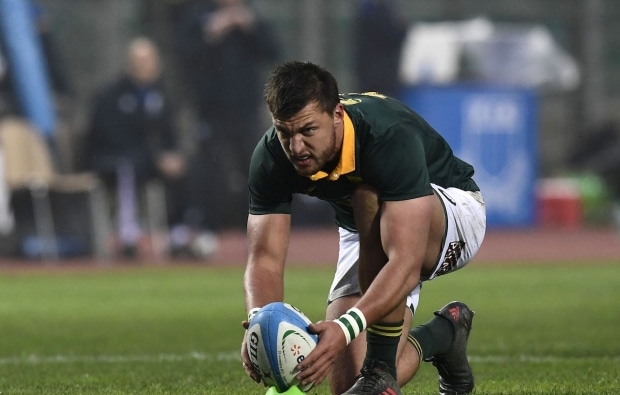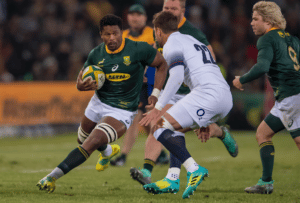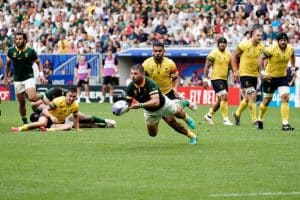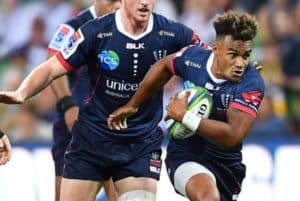Game management and goal-kicking will separate the top teams in the final round of the Rugby Championship and at the World Cup, writes JON CARDINELLI.
The fourth round of the Currie Cup served up two shock results. The Pumas beat a Sharks side packed with Test and Super Rugby stars in Nelspruit, while Griquas thumped a more fancied Blue Bulls team in Pretoria.
The Sharks and Bulls had their chances to win those matches. Poor game management, however, as well as a tendency to turn down a shot at goal cost them points at crucial stages of the contest.
Indeed, it was the so-called minnows who delivered a series of important lessons that every South African coach and player would do well to heed. The Pumas took the three points when they were on offer, and thus remained in the contest despite being three tries down by half-time. Griquas, via the flawless boot of George Whitehead, kept their foot on the throat of the Bulls to claim a famous win at Loftus Versfeld.
Game management – or more specifically the decision of when to shoot for goal and when to kick for the corner and push for a try – has been a hot topic in recent years. In the wake of many narrow losses, captains have been asked why they didn’t take the points – in other words the kick at goal – when they were on offer.
ALSO READ: Boks have grown into tight unit
Some teams may feel that they have the upper hand at the lineout at a particular point of a contest, and that a penalty deep in the opposition 22 represents a chance to maul over the tryline or possibly force the opposition to concede a yellow card.
A lot of coaches will tell you, however, that there’s not a great chance of success in that scenario. The kick to touch sets up another contest – in which the opposition can steal the lineout feed or sack a resultant maul.
It’s not as clear-cut a scoring opportunity as a kick for goal, where success or failure is determined by the kicker’s accuracy from the tee.
All that said, there were some encouraging signs shown by the top South African players on the game management front during the Super Rugby tournament.
The Bulls – with Bok flyhalf Handré Pollard and No 8 Duane Vermeulen leading the charge – often opted to build scoreboard pressure when there was an opportunity to do so.
The Stormers’ draw with the Crusaders at Newlands was as good as a win. Siya Kolisi ignored the advice from the sideline in the dying stages of the contest and instructed flyhalf Jean-Luc du Plessis to shoot for goal.
He weighed up the pros and cons and realised that there was a clear-cut chance of drawing with the leading side in the tournament.
Kolisi has come a long was since being appointed Stormers skipper in early 2017. He is currently recovering from a knee injury, but is expected to return in the coming weeks and should lead the Boks at the World Cup in Japan.
The Boks will need leaders who understand the difference between a calculated risk and an outright gamble. If all are fit and available, Kolisi will be well supported by a leadership core that includes Pollard, Vermeulen, Pieter-Steph du Toit and Eben Etzebeth.
Pollard has been kicking well at Super Rugby and Test level this season. Elton Jantjies produced a fine kicking performance when he started against Australia several weeks back.
The Boks must use these players to build scoreboard pressure if the situation allows. If they’re trailing, they must back these men to chip away at the deficit.
The Rugby Championship is not the be-all and end-all in a World Cup year. And yet for the Boks – who will travel to the World Cup as underdogs, and who haven’t won a trophy since 2009 – the decider in Salta will matter a great deal.
It wouldn’t surprise to see Vermeulen – filling in for the injured Kolisi – instructing Pollard to kick for goal in the early stages of the clash against Argentina. The Boks will look to attack the weak Argentina scrum and to translate any resultant penalties into points.
The Boks will know by kickoff what’s required to win the Rugby Championship title. If the All Blacks thrash the Wallabies in the earlier fixture staged in Perth, the Boks may need to push for a bonus-point in Salta or at least ensure that they win by a big margin.
That shouldn’t alter their approach from the outset, though. The Boks should be looking to cash in on every opportunity and to build scoreboard pressure before cutting loose in the latter stages.
It’s a big game for the Boks in the context of their 10-year trophy drought. It will also present the side with a fine test of their game management abilities before the all-important World Cup.
Photo: Miguel Medina/AFP





